2010.10.26[Interviews]
Reha ERDEM: A New Master of the Turkish Cinema Interview with Reha Erdem (10/26) part 2


---You mentioned some names of your favourite film makers during the Q&A about ŌĆ£Oh Moon.ŌĆØ Do you mind telling me the names again?
From the American monochrome filmmakers in the 1950, I like Orson Welles, Howard Hawks, and Otto Preminger. From the Japanese films, I like Kenji Mizoguchi, Akira Kurosawa and Yasujiro Ozu. In Europe, I like Rossellini, Bresson, Jean Renoir, and Ingmar Bergman. From the modern film makers, Ming-Liang, Apichatpong Weerasethakul, whose ŌĆ£Uncle Boonmee Who Can Recall His Past LivesŌĆØ won an award at Cannes this year, and Lucrecia Martel are the three directors who crossed the boundary in the film industry and entered a new frontier. I mentioned that Yasujiro Ozu keeps doing the same thing, but I think a film is one part of a whole thing, and each part makes up the whole. I may have read about it in an autobiography or a diary, but I sense Japanese and sensitive rhythm.
---At the end of ŌĆ£Mommy, IŌĆÖm Scared,ŌĆØ all the characters come together and hear the two sons screaming ŌĆ£Mommy, IŌĆÖm scared.ŌĆØ Then the scene changes to the apartment where they live, followed by 9 more cuts of the interior of the apartment and laundry drying in the wind without any people in the frame, before the film ends. This ending is typically characteristic of Ozu.
It was not intentional, but since youŌĆÖve mentioned it, it may be so. After various events, anger and caterwauling, scenes of furniture in the house are soothing. Underwear is hung up to dry, old shoes on the floor, etc., these objects help clear the tension. Tolerance is the theme that is why it was originally called ŌĆ£WhatŌĆÖs a Human Anyway?ŌĆØ
---I think your latest film, ŌĆ£KOSMOS,ŌĆØ has an unprecedented level of tension, and it will be an important work when you look back on your filmography in the future. You mentioned it in the Q&A that the caretaker of the monastery was called ŌĆ£KOSMOSŌĆØ in the script, although he did not have a name in the film. You said this character was introduced to lead the unlucky girl to salvation. On the other hand, Kosmos, the protagonist of this film is a mixture of various characters, such as an early man, a healer, a good-for-nothing like the Russian poet, Brodsky, who was punished for not working. What does the development of Kosmos as a character mean to you?
There was another project after ŌĆ£Oh MoonŌĆØ but I couldnŌĆÖt do it because of the funding issue. The name of the protagonist was also called Kosmos. I am particular about the name, Kosmos, and the Kosmos in this film did not come from Kosmos in ŌĆ£Oh Moon.ŌĆØ Kosmos is implausible, superman, super hero, and the most idealist man. In my other films men are all useless, but not in this film. He has some manga-like aspect, but he is a person I would like to become most. There is a scene where he treats a sick person, but we cannot see if he is really treating. He steals some money, but he just saves it and does not use it at all. To me, it is even worse if you save the stolen money. Kosmos is generous. He does not slave away to buy a new car, he just refuses to work for a simple reason that he wants to fall in love. He talks about things like a holy book and other people have problems understanding him. But this is the character I would like to follow.
---It was surprising to see the crash of a satellite rocket caused Kosmos to lose his ability as a healer. There was a Soviet satellite called Kosmos in the past, and several thousand satellites, both military and civilian. It is well known that Kosmos 954, with an onboard nuclear reactor, crashed in Canada, spreading radioactive pollution. Viewers will be able to feel many things even without such background knowledge, but did you have in mind the Kosmos satellite incident?
Of course I knew about the satellite. However, I would like to make it clear that Kosmos did not lose the ability as a healer. He can sometimes do it but other times he cannot. He only makes others to believe like that. He cannot heal the teacher, but he heals the asthmatic old man, and the depressed child starts to communicate with others. It may be because of Kosmos, but it may not. Something in life may have caused it. Healer is an entity which indicated the path when various elements match well. People blame Kosmos for not being able to show the way because he is different. On the other hand, those who are in power and military personnel, although they do not bring any benefit to people they are respected. Going back to the satellite, it was made for the filming, and Russian words were written on the body. The crash of the satellite and his loss of ability as a healer are coincidental, but as the Soviet Union and Turkey share the border, some satellites did fall from the sky (laughs). Satellites may crash, but Kosmos seeks to defy the gravity and live on.
Interview with Reha Erdem part 1
2010.10.26[Interviews]
Reha ERDEM: A New Master of the Turkish Cinema Interview with Reha Erdem (10/26) part 1


---We are so pleased to have you for the third time at TIFF this year. All six of your feature films are screened this time, and I am surprised to see the change in the style from the debut film ŌĆ£Oh MoonŌĆØ (1988) to the latest ŌĆ£KOSMOSŌĆØ (2009). ŌĆ£Oh MoonŌĆØ was a gothic fantasy in monochrome with no apparent national characteristics, but the following ŌĆ£A Run for MoneyŌĆØ (1999) and ŌĆ£WhatŌĆÖs a Human Anyway?ŌĆØ (2004) were comedies, almost a complete change of course to return to classics. Then ŌĆ£Times and WindsŌĆØ (2006) and ŌĆ£My Only SunshineŌĆØ (2008) changed again towards sound and images that speak to the audience. Would you tell us about these changes in style, please?
Looking back, each one of them is linked within me, or each is repeated. A film is a rich and diverse format and it contains many elements. Each different element makes a different form. ŌĆ£A Run for MoneyŌĆØ places more emphasis on the story development, but ŌĆ£Times and WindsŌĆØ is expressed with accents on different elements such as time and space. Each film is an expression of different conditions. I find it boring to make films in the same way. It is better to grow different crops in one garden.
---I think there are two types of filmmaker. One is like Yasujiro Ozu, who refines a particular style, and the other is like Jean-Luc Godard, who transforms the style for each film.
Both Ozu and Godard are excellent predecessors and I like them both very much. I may be closer to Godard for the reasons I just explained. There is a big format of a film and there are many elements within it. You use each element to create each film. On the other hand, there are filmmakers like Abbas Kiarostami, who make similar films in a similar way. It is great, but sometimes I feel bored. I donŌĆÖt mean to insult Kiarostami at all, but GodardŌĆÖs world is renewed with every film. Yasujiro Ozu is exemplary to me, just like Kiarostami, as each film has its taste. However, I prefer Godard who renews his world with each work, however, subtle.
---The style changes, but there seems to be some commonality among your characters: a child without parents or with just one parent, a child who takes care of parents who are prone to illness, a child who expresses its loneliness by abusing animals. These are all the same character. What does it mean to have one character who keeps appearing as in a serial form?
It may look like that with hindsight, but I only noticed it afterwards. I did not think in that way during production. As my own issues are reflected in the film, it turned out like that although I was not conscious of it. For example, I did not notice that the girl in ŌĆ£Oh MoonŌĆØ was acting my past. It stunned me when I realized it. I see them as figures rather than characters, and the series of events are very similar to my personal experience on the psychological level, and I discovered that the girl is myself.
---Do you mean the episodes, such as of a child smoking behind the parentsŌĆÖ back, or a child afraid of circumcision are based on your personal experience? So your emphasis is more on the psychology of the characters than each event.
Exactly.
---Is there anything you pay particular attention when you create characters or figures?
I move the figures at a level which is not real. ŌĆ£Mommy, IŌĆÖm ScaredŌĆØ has many figures in the story, but each one is different from people in real life. They have been created. They are presented at a completely different level, away from actual human beings. This is an important point. I am not keen on images which are clipped from real life, like candid camera, and those based on naturalism. My ideal film is that each figure is created and each is in a dream. My films often have people from Istanbul but they are completely different from the real people in Istanbul. The same goes with the mother in ŌĆ£Mommy, IŌĆÖm Scared,ŌĆØ she is not a mother you may find in real life, but she is a figure which has been created. She is strong and powerful enough to overwhelm men, but she is encompassing and compassionate with a strong voice. It is the role of films to create a figure who you do not know. I wouldnŌĆÖt know what to do if that is my real mother. The son is completely different from the mother; he is a shrinker with a different tone of voice. I create a series of figures like this, like toys.
---I would also like to ask you about the configuration of the figures. In the first half of ŌĆ£Oh Moon,ŌĆØ the girl is lying on her back in her room, and the composition looks very similar to that of a painting by Balthus. How intentional is it to reflect your art and film background in your work?
I am glad youŌĆÖve asked. ItŌĆÖs sometimes intentional but it just happens other times. I learned film and figurative arts when I was in France. I like them both. I have many of my favourite artists, and Balthus is one of them. In ŌĆ£Oh Moon,ŌĆØ there is also a scene later when an aunt comes to the girl who is playing a card game, patience (solitaire), and says, ŌĆ£Oh, Patience!ŌĆØ. That is another example. (Note: Balthus painted a picture with similar composition, entitled ŌĆ£La PatienceŌĆØ.) I also looked for relevance between Balthus and Greco at that time and intentionally included the symbols in the film. I like doing things like that. It is not limited to pictures, but I do the same with literary works. For example, I have borrowed names for the characters from a Turkish work of literature. More recently, there is a comical scene with three brothers in ŌĆ£KOSMOS.ŌĆØ I had ŌĆ£The Brothers KaramazovŌĆØ in mind for that.
---Is that the scene in the first half when patricide and inheritance are discussed?
Yes. In the world of films, there are large formats and everything is positioned within it. For example, you can gather your favorite food or food you donŌĆÖt like, arrange them or exclude them. ItŌĆÖs the same with Balthus. I have been working with Florent Herry, the cinematographer, and we discuss which picture we will use as a backdrop for the next film before we write the script. We decide on the spirit and color of the film first of all. We had Edward Hopper in mind when we did ŌĆ£A Run for Money.ŌĆØ We make the decision at the beginning, but sometimes we decide to change it during the production. If Florent came with me to Tokyo this time, I wanted to visit art museums in Tokyo together to talk about ideas for the next film. ItŌĆÖs a pity we couldnŌĆÖt do that.
Interview with Reha Erdem part 2
2010.10.26[Event Reports]
10/26 (Tue) Competition Section "Sarah's Key" Press Conference: Notes & Quotes

Date & Time: October 26th (Tuesday), from 14:00 @Movie Café
Appearance: Gilles Paquet-Brenner (director/script)
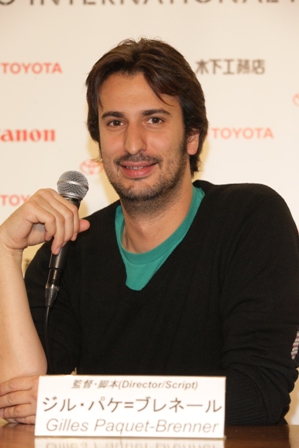
Here are some notes and quotes:
Q: I want to know your age. Now, you previously spoke about the fact that there are Holocaust victims in your family.
Director Gilles Paquet-Brenner (D): My birthday is Sept. 14, 1974; I am 36. My grandfather was a German Jew. He was a musician living in a free zone in France, but was denounced by the French, and died in the concentration camp. His father and his uncle were from Berlin, and also died in the camps. There is a tribute to my grandfather in the film. It's the scene with the man with the poison in the ring. That's actually the story that I didn't know that my brother told me while we were preparing the film. I put it in the film because I thought it was so heartbreaking, but also full of humanity to imagine that when you have nothing left, the only thing you got is deciding when you are going to die.
Q: You said that "unless we really reflect on the past, it will be difficult to create the future." Could you elaborate?
D: The young generation, they do not want to talk about the past but only want to move forward. And probably in reaction to the older generations who talk about the past. I thought about a way to talk about it, so that the young generations can connect to the past and understand why it is important for us. So I put the two periods of time in parallel to show that the past has the influence on the present, and that when you face and understand the past, you can build a more solid future. It's also important not to forget. We are still quite close to the World War, but in 30 years, if the younger generations do not want to talk or hear about it, what is going to happen? A lot can happen unfortunately. I think basically the past is the ground that you can put in the tree to grow.
Q: How true is it to the original novel? How was the book received in France?
D: Yes, the film is very close to the book. There are minor differences. In the book, the little boy goes into the closet by himself, but in the film Sarah asks him to, so she has more guilt. Also you don't see Sarah growing up in the second part of the book as you see her in the film. Also the scene between William and his father doesn't exist in the book. Yes, the book is very successful in France. But what was very difficult in France was to have it published. Tatiana was not a best-selling author then, and because she is not Jewish, all the publishers though "No one would be interested; what can you write about it when you are not Jewish!" It took 3 years for the book to be published.
Q: How was the film received in France? It deals with the past the French do not necessarily want to remember.
D: It really depends on their age and how they are related to this history. Older people, some are very interested but some rejected it for obvious reasons. But the young generations have more perspective. So, on the one hand, they are shocked because they did not know that French police were involved in it. They thought it was all about the Germans and the Nazis. Good thing is that they don't feel guilty; they weren't there, they weren't even born.
Q: The description of the past and the present are well connected. Was there any technical difficulties?
D: Connecting the two periods of time was a major difficulty because you have to keep the film fluid. We worked hard on the script to make sure that two parts would be in resonance. In filming, we were careful about the last of a sequence and the first shot of the next sequence, between the two periods of time. Technically, it wasn't necessarily difficult, we were cautious in making it fluid for the audience. I didn't want the audience to feel that they were watching two films; I wanted them to watch one film with two parallel periods of time. The original book is way longer. Basically, we kept everything that was related to the plot, and what are essential the characters, to Sarah and Julia.
Q: The three generations intertwine. What was the intention behind using these three generations of people?
D: Intention would be that, depending on your age and background, you don't react to the past and the war, or the
past or the present the same way. The young journalist saying 'I watched it on TV' of course is sarcastic. It was a
way to show that we don't have a lot of sensibility to what's happening every day, to every conflict in the world
because there are so many and we don't really care. Younger generations don't care about the past, but they
don't even care about the present. I don't like the word message, but that's one of the messages. By watching the
tragedy of Sarah from yesterday, we could try to understand that there are lots of Sarahs today.
Sarah's Key
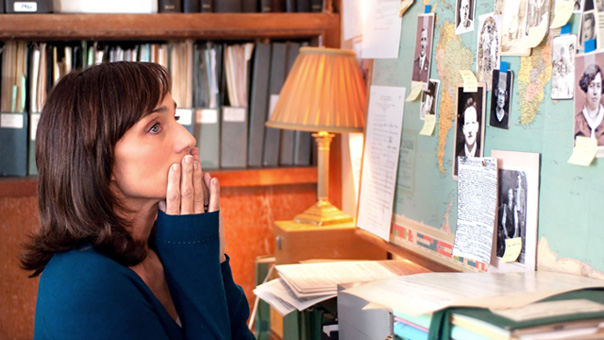
2010.10.26[Event Reports]
Rapping Reality: The DGJ New Directors Award Winner, Screening and Symposium, will be held on 10/28.

The additional directors from abroad will be visiting us to participate in the symposium!
Belma Bas (Director)ŃĆĆZephyr
Sinisa Dragin (Director) ŃĆĆIf the Seed Doesn't Die
Don't let this one and only chance pass you by!!
The DGJ New Directors Awards, Screening and Symposium.
Co-Hosted by Directors Guild of Japan/TIFF Executive Committee
Date and Time: 10/28 (Thu) 18:00 ŌĆō
Venue: TOHO CINEMAS ROPPONGI HILLS SCREEN1
Screening title::
8000 MILES: SR Saitma's Rapper
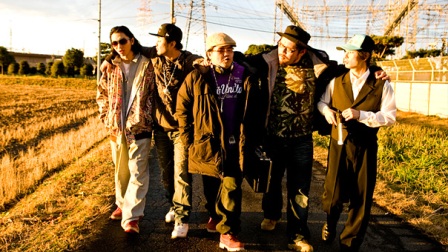
Advance Ticket: 800 Yen per ticket (tax included)
Walk-up Tickets at Theatre Box Office: 1,000 Yen per ticket (tax included)
Ticket PIA P-Code 560-536 (Japanese Site)
Lawson Ticket L-Code 32577(Japanese Site)
Symposium will be held following the screening of 8000 MILES: SR Saitama's Rapper:
Guest Speakers:
Yu Irie (Director)
Belma Bas (Director) ZephyrŃĆĆ
Sinisa Dragin (Director) If the Seed Doesn't Die
Master of Ceremony:
Kaizo Hayashi (Director)
Please note that the admittance to the symposium will be limited to the audiences of the 8000 MILES: SR Saitama's Rapper only.
2010.10.26[Event Reports]
10/26 (Tue) Competition Section "Flamingo No.13" Press Conference: Notes & Quotes

Date & Time: October 26th (Tuesday), from 15:45 @Movie Café
Appearance: Hamid Reza Aligholian (director/editor), Rasoul Younan (screenplay/actor), Baran Zamani (actress), Houman Ahmadi Tofighi (producer)
Here are some notes and quotes:
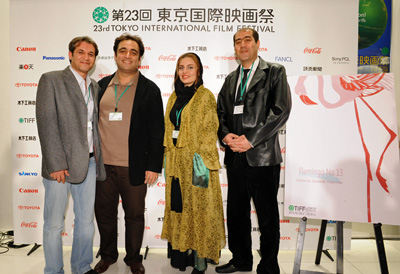
Mr. Hamid Reza Aligholian (D): I am very grateful that we are able to participate in TIFF. I hope you all liked my film.
Mr. Rasoul Younan (RY): Konnichiwa! I am also very happy that I am in Tokyo.
Ms. Baran Zamani (BZ): I would like to say hello to you on behalf of the Iranian film industry.
Mr. Houman Ahmadi Tofighi (HAT): I would like to extend my gratitude to the people of Japan.
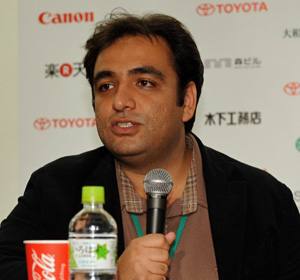
Q: Director Aligholian, this is your first feature film, how do you feel to have it screened internationally?
D: I am very happy that it is screened here in Tokyo, too, and I really would like to hear the impressions and opinions of the people whoŌĆÖve seen this film.
Q: I understand this film depicted the depth of the Iranian culture, as well as artistic aspects like costumes and dance. Did you have any assumptions on how it would be received by the audience outside of Iran?
D: People from different ethnic backgrounds are in the film, and their outfits and dances were also shown. I am personally attracted to those ethnic cultures, and I hope you felt the same watching my film.
Q: I had an impression that the story was quite classical. Is it based on a folk tale or another story?
D: No, it is an original story. Or rather, it is based on the poem written by Rasoul Younan. It is a long poem; he had pages and pages of poem, we sat down and spoke about making it a story. And that led to making of this film.
Q: This is a question to the producer. After reading the screenplay, why did you decide to produce this film?
HAT: I've known Mr. Aligholian, the director, for 10 years through film-making business. And we always talked about making a film together if we found a good screenplay. We got one, so we made the film.
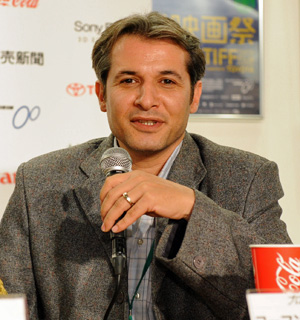
Q: Ms. Zamani, would you share your experience as an actress with us?
BZ: I have played small parts at theater for two years. To tell you the truth, I prefer theater to movies. The first movie I played in is called Shirin. Actually, I am starring in a different film in Iran. There are different attractiveness to theater and film. Films have opportunities to be seen by more people and internationally. As for theaters, yes, sometimes we participate in festivals, but the performances tend to shown domestically, or at limited areas within the country. The world is somewhat smaller.

Q: You explained that this is based on an original story, but towards the end, a story Shakhta Baba is introduced. Is Shakhta Baba familiar to all Iranians? Or is it particular of a certain ethnic group? I felt that the fact that Shakhta Baba brings hope matches the theme of the film.
RY: Shakhta Baba is a Santa Claus-like figure. He comes at around the same time Santa Claus comes. Toward that season, people will write their wish or dream on a piece of paper, and burn that paper hoping that the smoke will reach Shakhta Baba and pray that their wish will be heard.
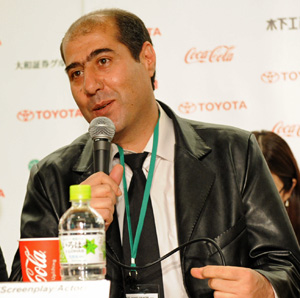
Q: Is this your first time in Japan? Iran and Japan has a long history of friendship. What is your impression of Japan now that you are here?
D: Japan is very impressive. The Japanese people are always smiling and always very polite. I'm glad I had a chance to come in contact with you.
BZ: I don't feel like I am in a foreign country; I feel right at home! Although there is a language barrier, I feel that we can relate to each other. I love Japan, and I hope I could come back every year.
HAT: I am able to bring back to Iran, all the love and generosity that Japanese people gave us as great souvenirs!
Q: Mr. Younan, being a poet, are there any Japanese writers or poets that you like?
RY: Yes, there are many poets and writers that I respect. Issa Kobayashi, Basho Matsuo, and Yasunari Kawabata are among the many I admire, but my favorite is Yukio Mishima. I believe that their words are very natural and come from the heart, and they understood nature very well.
Flamingo No.13

Film Information
2010.10.26[Event Reports]
10/26 (Tue) Competition Section "Buddha Mountain" Press Conference: Notes & Quotes

Date & Time: October 26th (Tuesday), from 16:45 @Movie Café
Appearance: Li Yu (director/scriptwriter), Fang Li (producer/scriptwriter), Sylvia Chang (actress), Chen Po Lin (actor)
Here are some notes and quotes:
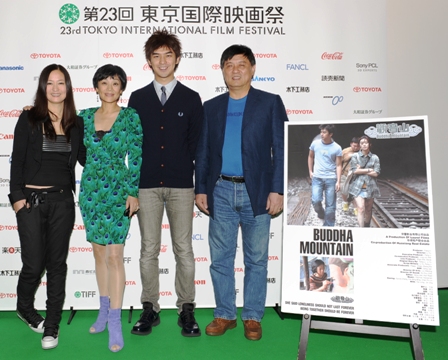
Director Li Yu (D): Have you seen the film already? I would be very happy if you liked it.
Ms. Sylvia Chang (SC): I play the role of Miss Chang, but many people see it as a role of an old woman.
Mr. Chen Po Lin (CPL): I'm grateful that so many people are here with us today. And I do not feel that Ms. Sylvia played an old woman's role. I was happy to able to work with the director and other members of the cast on this film.
Mr. Fang Li (FL): I was involved in this film in three different ways. Firstly, I am the producer. Secondly, I worked closely with Director Li to complete the script. And finally, I punched over and over again as the father of Ding Bo played by Chen Po Lin!
Q: Wasn't it hard to play the father while you were the producer? And Mr. Chen Po Lin, to act with your producer?
FL: It was not me but perhaps the director who felt more pressuredŌĆöIt must have been harder for him. After all, I am his producer! Well, I was Chen Po Lin's father in the film, so if Chen Po Lin did not do his part well, I was able to threaten him that there will be no dinner! So it must have been tough for him, too. I really had no problem at all!
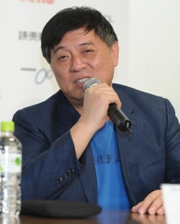
D: As a director, I try to provide an environment where actors could act, and I let them act freely. So it wasn't me who felt the pressure, but the actors.

CPL: Yes, the pressure was pretty big! I had to punch someone, who was the producer a minute ago. It was not an easy position to be in. However, it was an exceptional experience and it was refreshing.

Q: Ms. Sylvia Chang and Mr. Chen Po Lin, please comment on each other as film actors.
SC: Ever since he appeared in Blue Gate Crossing, I always thought that he was a wonderful actor. He is my favorite type of actor. And later, he played a guest starring role in twenty thirty forty, the film I directed. He appeared in two scenes. That was the last we worked together until this film. I felt that he really has grown as an actor. He has more style, and I see more sharpness in his acting. Well, Chen Po Lin, I hope you will return my great compliments!
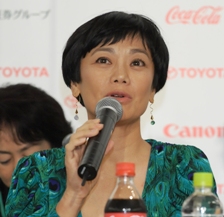
CPL: I first met Ms. Sylvia Chang 8-9 years ago. Ever since, she has gotten 8 years, 9 years, or 16 years younger! And more beautiful! When she gave me a role in twenty thirty forty, I was still a kid. But since then, I built on my experience in Beijing, Hong Kong, and Tokyo, and I hope she saw the difference and really meant what she said! I'm flattered. I've always played roles of shallow, flirtatious characters, but as Ding Bo is more suppressed, I had to play down, so it was very challenging. I'm really flattered to be told that I've grown up as an actor. It was fun working with her. She did not exactly instruct or teach me, but there was so much to learn through her acting.
Q: Mr. Chen Po Lin, you've been in Japan many times and you almost speak the language fluently. How about Ms. Sylvia Chang? Is this your first TIFF?
SC: No, as a matter of fact, I think I've participated 1-2 times before. Someone reminded me earlier that I came here with Rice Rhapsody (alternative title Hainan Chicken Rice). But this time, we are here with our film in the Competition Section which makes the occasion so special. Chen Po Lin and I am in the film as Taiwanese actors, for the film made by Director Li Yu and other cast and staff from mainland China, and it was such a fun experience. The beauty of the mind is the same wherever you go. Pure commitment in filmmaking has no borders. So I am more than pleased to have been a part of this film, and also to have participated in TIFF. Thank you.
Buddha Mountain
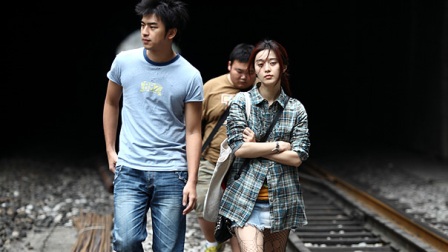
2010.10.25[Event Reports]
Photo Report: 10/25 Guest Appearance
A Liar and a Broken Girl: Stage Greeting @ TOHO CINEMAS ROPPONGI HILLS SCREEN6
Guest: Natsuki Seta(Director/Screenplay), Aya Omasa(Actress), Shota Sometani(Actor), Tomoko Tabata (Actress)
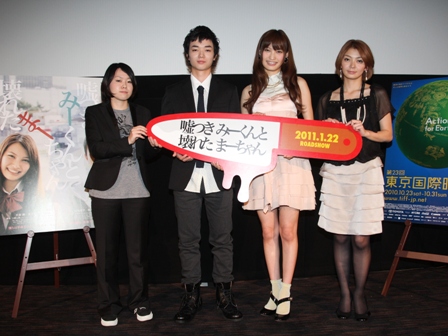
Winds of Asia-Middle East, Taiwanese Cinema Renaissance: New Breeze of the Rising Generation
Taipei Exchanges: Q&A @ TOHO CINEMAS ROPPONGI HILLS SCREEN5
Guest: Hsiao Ya-chuan(Director/Script), Zaizai Lin(Actress), Kosuke Atari(Musician)
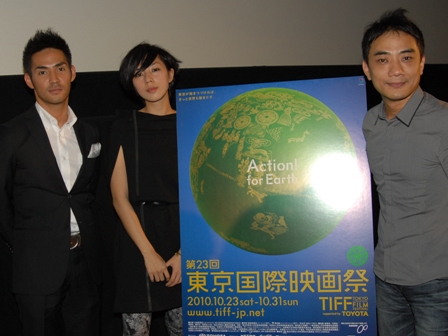
Competition
Primary!: Q&A @ TOHO CINEMAS ROPPONGI HILLS SCREEN1
Guest: Francisco Alfonsin(Actor) , Dan Uneken(Producer)
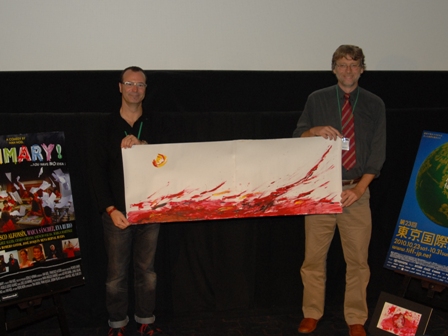
Special Screenings
STRANGERS IN THE CITY: Stage Greeting @ TOHO CINEMAS ROPPONGI HILLS SCREEN2
Guest: Toru Nakamura(Actor), Manami Konishi(Actress), Nao Minamisawa(Actress), Junji Sakamoto(Director), meg (Theme Song)
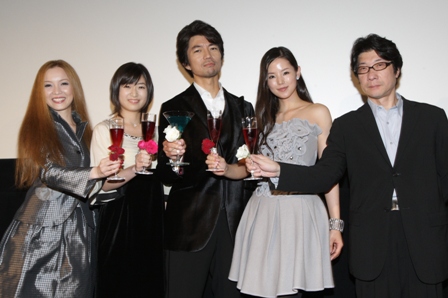
Winds of Asia-Middle East, Taiwanese Cinema Renaissance: New Breeze of the Rising Generation
The Fourth Portrait’╝ÜQ&A @ TOHO CINEMAS ROPPONGI HILLS SCREEN5
Guest: Mong-hong Chung(Director/Screenplay)
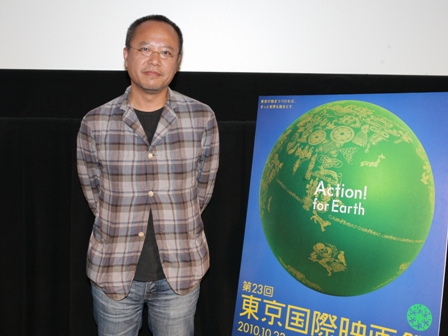
Competition
Flamingo No.13: Q&A @ TOHO CINEMAS ROPPONGI HILLS SCREEN7
Guest: Hamid Reza Aligholian(Director/Editor), Rasoul Younan(Screenplay/Actor), Houman Ahmadi Tofighi(Producer), Baran Zamani(Actress)
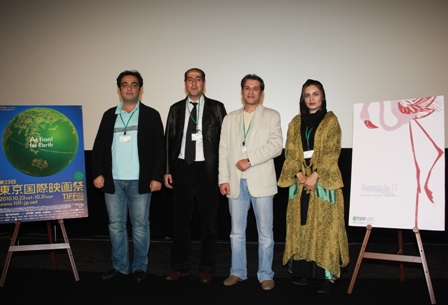
Special Screenings
Into the White Night: Stage Greeting @ TOHO CINEMAS ROPPONGI HILLS SCREEN7
Guest: Maki Horikita(Actress), Kengo Kora(Actor), Eiichiro Funakoshi(Actor), Yoshihiro Fukagawa(Director)
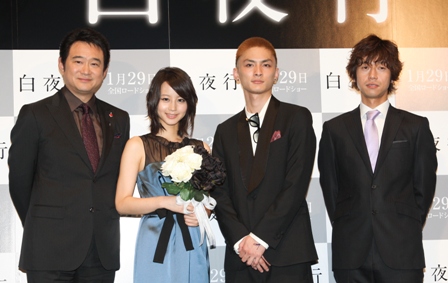

Winds of Asia-Middle East, Taiwanese Cinema Renaissance: New Breeze of the Rising Generation
Let the Wind Carry Me: Q&A @ TOHO CINEMAS ROPPONGI HILLS SCREEN5
Guest: Kwan Pun-leung(Director/Cinematographer/Editor), Chiang Hsiu-chiung(Director/Cinematographer)
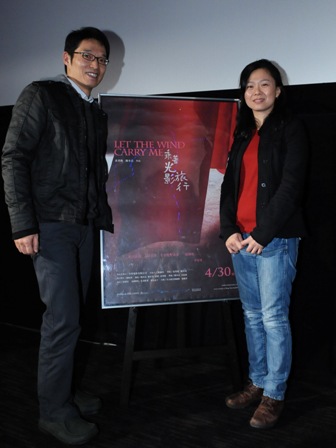
Winds of Asia-Middle East, Taiwanese Cinema Renaissance: New Breeze of the Rising Generation
"Taiwanese Cinema Renaissance: New Breeze of the Rising Generation" Symposium@ TOHO CINEMAS ROPPONGI HILLS SCREEN5
Guest: Doze, Niu Chen-Zer(Director "MONGA"), Hsiao Ya-chuan(Director/Script "Taipei Exchanges"), Khan Lee(Producer "Juliets"), Hou Chi-jan(Director/Writer "Juliets")
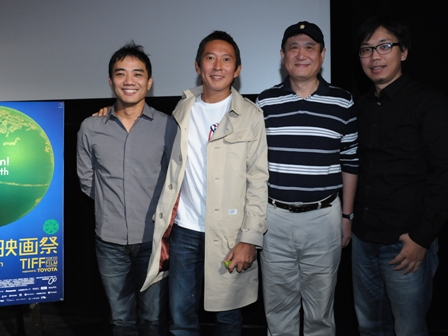
Winds of Asia-Middle East
Love in a Puff: Q&A @ TOHO CINEMAS ROPPONGI HILLS SCREEN2
Guest: Pang Ho-cheung(Director/Producer/Original Story/Written)
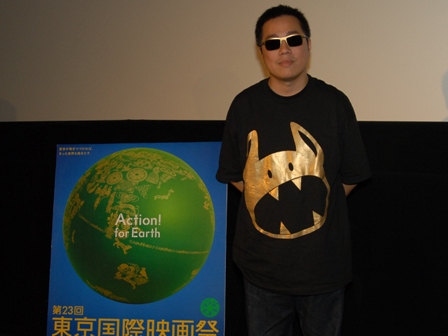
Special Screenings
GARO-RED REQUIEM: Stage Greeting @ TOHO CINEMAS ROPPONGI HILLS SCREEN2
Guest: Keita Amemiya(Director), Ryosei Konishi(Actor), Mary Matsuyama(Actress), Saori Hara(Actress)
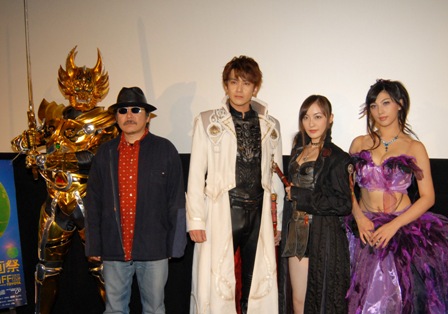
Competition
Intimate Grammar: Q&A @ TOHO CINEMAS ROPPONGI HILLS SCREEN6
Guest: Nir Bergman(Director/Screenplay), Orly Zilbershatz(Actress)
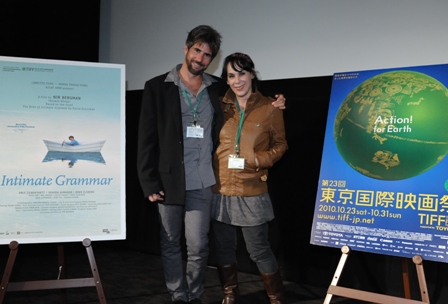
Winds of Asia-Middle EastŃĆĆ
Camellia: Q&A @ TOHO CINEMAS ROPPONGI HILLS SCREEN5
Guest: Isao YUKISADA (Film Director)
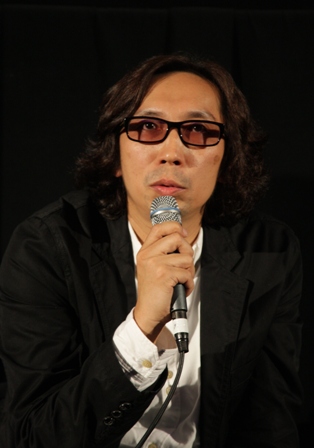
Friendship Award Ceremony
Guest: Kim Dong-ho(Pusan International Film Festival Director)ŃĆĆ
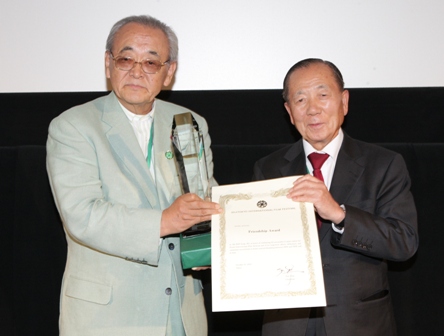
natural TIFF supported by TOYOTA
The Elephant Simultaneous Screening : Wake up!! TAMALA: Stage Greeting @ TOHO CINEMAS ROPPONGI HILLS SCREEN1
Guest: t.o.L("Wake up!! TAMALA"Director)
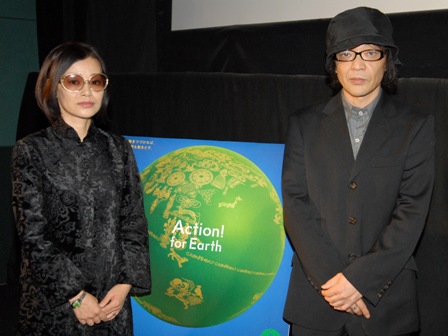
2010.10.25[Event Reports]
Friendship Award Awarding Ceremony Report (10/25)
Date & Time: October 25th (Monday), from 22:45 @TOHO Cinemas Roppongi Hills, Screen 5
Appearance: Kim Dong-ho (Director of Pusan International Film Festival)
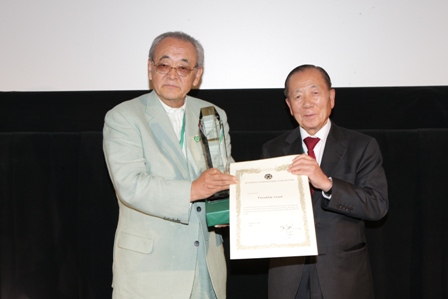
Here are some notes and quotes:
Camellia, a three-segment omnibus about romance in Pusan, was screened as the closing film at the 15th Pusan International Film Festival (PIFF) on October 15. The omnibus by three directors from Korea, Thailand, and Japan, is a part of the Pusan Project lead by Mr. Kim Dong-ho, Festival Director of PIFF. Mr. Kim Dong-ho has made great contributions to the film industry in Asia through PIFF, and has been a great supporter of the Tokyo International Film Festival (TIFF). TIFF praised Mr. Kim Dong-ho's achievement by presentation of the Friendship Award.
Following the screening of Camellia, a special invitation film in the Winds of Asia-Middle East section, TIFF and TIFFCOM Chairman Tom Yoda made honorable recognition of Mr. Kim Dong-ho.
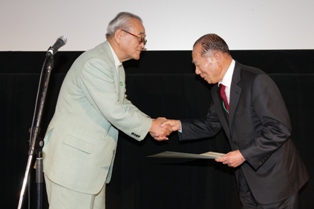
Chairman Yoda: Even before I assumed the post of Chairman at TIFF, Mr. Kim Dong-ho, Festival Director of PIFF has supported TIFF. He has watched over our film festival with deep friendship. I feel that we are extremely fortunate to have a great friend like him. Now, I would like to take this opportunity to express our respect and gratitude by presenting Mr. Kim Dong-ho with the Friendship Award.
Mr. Kim Dong-ho: TIFF commenced 10 years earlier than our PIFF, and it is one of the prestigious film festivals in the world. I am extremely honored to have been invited. When PIFF commenced, Japanese films were not imported freely into Korea. However, we have always screened 15 to 20 Japanese films at PIFF. Especially after Mr. Yoda became the Chairman, the two film festivals have been nurturing collaborative relationships. I feel very fortunate that we are no longer competing with each other as we had in the past. I deeply respect Chairman Yoda, and he is much more than just a close friend. The film you have just watched has been created by great directors from Japan, Korea, and Thailand, based on the concept of romance. It was an honor to be given an opportunity to have it screened at TIFF. Thank you very much.
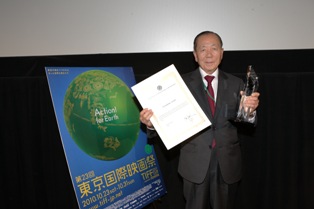
Chairman Yoda read out the certificate of commendation and presented it with a trophy to Mr. Kim Dong-ho.
Chairman Yoda: Tokyo International Film Festival hereby presents Friendship Award to Mr. Kim Dong-ho in honor of celebrating his successful 15 year's career for the Pusan International Film Festival and his long term efforts, dedication and sustained commitment to foster mutual friendship between Pusan International Film Festival and Tokyo International Film Festival and in Asia.
2010.10.25[Interviews]
ŌĆ£Primary!ŌĆØ Interview with Francisco Alfonsin (Script writerand Actor) and Dan Ukenen (Assistant Director) (10/25)


---I was really surprised to see how vividly the children are portrayed. The relationship among teachers on the sideline is also thought-provoking, and I was drawn to the film before I knew it.
Francisco Alfonsin (Alfonsin): The director, Ivan Noel, taught art at a primary school for a year, which led to the production of this film. The children in the film are the pupils he taught back then. I wanted to show the creativity, sincerity and honesty of children as they are, so before we prepared the script, we filmed a real lesson for 30 to 40 minutes to capture the children on lens. It wonŌĆÖt work out as a film without some story, so we characterized the art teacher, Spanish teacher and math teacher, but that only provides a frame, and the children are the true protagonists.

---There is a scene where a child with ADHD is behaving hyperactively, that was like a documentary.
Alfonsin: That child does suffer from it and needs medication every day at 2 oŌĆÖclock even during a lesson. That is a true story.
---Does that mean the lesson scenes are all real?
Dan Ukenen (Uneken): The film is a recreation of real events as Ivan taught art at primary school. WeŌĆÖve asked children to do exactly the same things again for the lesson scenes.

---I was taken aback by the childrenŌĆÖs rich creativity. They draw a picture of a tree, and explain with a logic that adults wouldnŌĆÖt even imagine, for example, ŌĆ£The root is crawling underground to go and get back what people took away from themŌĆØ, or ŌĆ£The tree is angry because the mother bird does not look after the baby birdsŌĆØ.
Ukenen: Both the pictures and the explanations are from IvanŌĆÖs experience a year ago.
---No wonder why it is so realistic. I would like to ask you about the interesting teachersŌĆÖ episode. The protagonist and an art teacher Jose Maria and the Spanish teacher Angustias are similarly unfortunate in terms of their relationship with their children, but their lives are portrayed contrastingly. One establishes a new relationship, while the other struggles at it. Did something particular inspire you for the portrayal with many connotations?
Alfonsin: All the teachers in the film are based on what Noel saw and heard over 20 years as a teacher. In that sense, each teacher is based on a model in real life.
---If the pupils are real pupils, are the teachers performed by real teachers, too?
Alfonsin: A few of them are real teachers. Four, including myself, are actors, who played the art, maths, and Spanish teachers as well as a psychological counsellor. The headmaster is played by a real psychiatrist at a prison in Serbia. In addition, a few parents are real parents from school.
---It is surprising to have managed such realistic staff meetings, etc. between the actors and amateurs. Teachers sit around the table and discuss all sorts of issues, sometimes in a highly-charged atmosphere and other times harmoniously, and I could almost feel I was present at the meeting.
Alfonsin: It is the directorŌĆÖs belief that truth cannot be told if the actors come to the fore (laugh).
---Parents turn up at a parents meeting and they start eating bananas at once. How did you come up with ideas like that?
Alfonsin: A boy, called Carlos, is said to have a special ability to see into peopleŌĆÖs mind, and then thought about something he could have seen.
---Carlos is the boy who wants to be a magician, and played the role of a wizard at the school play?
Alfonsin: Magician could be the god who knows the truth (laugh). From CarlosŌĆÖs point of view, parents who say old-fashioned things at parentsŌĆÖ evening are no better than monkeys, thatŌĆÖs why they start eating bananas all at once.
---In that scene, a teacher suggests to take children to the river and teach them maths while doing some fun things, too. But the parents object for fear of any accidents. This kind of integrated study has been tried in various forms in Japan, too. It was a memorable scene as it cynically portrays that teachers wishes alone may not always work out. Do things like this happen often in Spain?
Ukenen: It is very conservative when it comes to education in Spain, so people are often doubtful about many new educational methods. ThatŌĆÖs why I receive requests from teachers at schools that deal with older children than in the film for reference.
Primary!
ŌåÆFilm Infomation
2010.10.25[Interviews]
ŌĆ£Love in a PuffŌĆØ Interview with Pang Ho-cheung (Director) (10/25)


---All of your films, except for the latest ŌĆ£Dream HomeŌĆØ (2010), have all been screened. What draws you to the TIFF?
Many audiences of the TIFF are so enthusiastic. They come to watch their favorite directorŌĆÖs films year after year. Audiences in Hong Kong come for the stars, but they see directors as ŌĆ£an author,ŌĆØ which is phenomenal for creators.
---Your original, and a little maniac viewpoint must be attracting an audience. How do you balance the commercial viability with the maniac features?
I am always aiming for a commercial success, so I donŌĆÖt know what to say about being maniac (laughs). Having said that, similar films tend to be made following a block buster film, but I have no budget to make a science fiction film in full CG just because ŌĆ£TransformerŌĆØ was such a smash hit. That is why I think of other ways, something that will attract the audience because it is different.

---In the Hong Kong film industry, one blockbuster used to be followed by a mass of films in the same theme. I sense your ŌĆ£modernityŌĆØ for avoiding such a custom.
I get easily bored and I cannot keep making films in the same theme (laughs).
---How did you come up with the idea of a love story involving smoking?
It was in Hong Kong. I had a meal with a friend, and then went to his office with him. A lot of women, not his work colleagues from different floors, greeted him in a friendly way by the lift. My friend told me that he came to know those women through smoking in a nearby alleyway because smoking is banned in the office. I was shocked! I have been missing the opportunities to get to know many women because I donŌĆÖt smoke! Since the smoking ban in Hong Kong, many such ŌĆśsocial placesŌĆÖ have come about, which are also places where people from different backgrounds meet. I started to write the script for ŌĆ£Love in a PuffŌĆØ after I realized this.
---The smoky location site must have been hard for you since you donŌĆÖt smoke.
I didnŌĆÖt even want to go near the site because it was filled with smoke. I persevered at the beginning, but then resorted to using a walkie-talkie. I had to adjust the amount of smoke, so I had a new set of smoke for each cut, and ended up going over budget. I underestimated the price of cigarettes.
---You said in the past, ŌĆ£I want to stick to pure Honk Kong films because the Hong Kong film industry is working more and more in collaboration with mainland China.ŌĆØ I was really impressed with this comment. This ŌĆ£Love in a PuffŌĆØ is definitely made in Hong Kong.
Having said that, the situation has changed, and I may not be able to avoid collaboration with mainland China. Film investors do not pay attention to 100% Hong Kong films any more. So I moved my production base to Beijing. I made a 40-minute short film (*1) to start with, and currently I am producing my first feature-length film in China (*2). Most of the recent Hong Kong-China collaborations have been big-budget period actions. I believe there are many other themes to be addressed, and I am intending to carry on making films with a twist in the viewpoint, and I would like many people to watch them.
*1 Directed by Derek Tsang / Jimmy Wan, Starring Zhou Xun and Lawrence Chow
http://ent.sina.com.cn/f/m/phxfao/index.shtml
*2 Directed by Derek Tsang / Jimmy Wan, Starring Shawn Yue and Zhang Jingchu
Love in a Puff
Film Information




